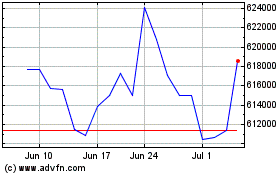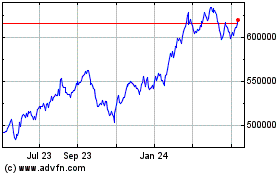By Anupreeta Das
As other investors bail out of IBM, Warren Buffett keeps piling
in.
Berkshire Hathaway Inc. bought more shares of International
Business Machines Corp. in the third quarter, according to a
securities filing, taking advantage of the stock's slide to load up
on an already large position in the technology company.
Mr. Buffett's continuing support for IBM has left many Berkshire
shareholders, analysts and others scratching their heads about what
the billionaire investor sees in the stock. Famously averse to
technology stocks, the Berkshire chairman and chief executive
officer had never made a big tech bet before IBM.
Berkshire owned about 81 million IBM shares valued at $11.75
billion as of Sept. 30, making it IBM's largest shareholder with an
8.3% stake. It first bought IBM in 2011, paying nearly $11 billion
for 5.5% of the company. Berkshire increased its ownership in
recent years through a mix of additional purchases and share
buybacks by IBM.
During this time, IBM shares have slipped about 28%, with sales
falling for the past 14 quarters. It has invested heavily in cloud
computing, security and big data as its traditional hardware and
related businesses falter. Some investors said they have soured on
the stock mainly because they are uncertain IBM's turnaround
strategy will work.
Mr. Buffett didn't respond to a request for comment.
Berkshire in the third quarter took a $2 billion book loss on
the value of its IBM stake. The amount was equivalent to 15% of its
cost to accumulate the stake, Berkshire said in its earnings report
this month. It said it has no intention of selling the stock and
expects the value of its investment not just to recover but to
eventually exceed its cost.
Mr. Buffett's moves appear to have little to do with a new
appreciation for the tech industry. Rather, as he wrote in his 2011
annual letter to shareholders, Mr. Buffett was attracted to IBM
because of its "brilliant" financial management.
"Indeed, I can think of no major company that has had better
financial management, a skill that has materially increased the
gains enjoyed by IBM shareholders," he wrote. "The company has used
debt wisely, made value-adding acquisitions almost exclusively for
cash and aggressively repurchased its own stock."
According to a survey of 23 analysts by Thomson One, only four
agree with Mr. Buffett that it makes sense to buy more shares.
"My guess is he has confidence in the management team and he
believes it should be able to add value" over the long term, said
Bernstein analyst Toni Sacconaghi. He said that in speaking with
other investors, the "profile of the investor who is interested in
owning IBM now fits the profile of the classic value investor" in
the mold of Mr. Buffett. Mr. Sacconaghi has a "hold" rating on the
stock.
IBM has long been one of the most active buyers of its own
shares. It repurchased nearly $4 billion of shares in the first
nine months of 2015. Stock buybacks are sometimes seen as a way to
return cash to shareholders, similar to dividends but without the
tax hit. By reducing the number of shares available for sale,
buybacks also boost per-share earnings for existing
shareholders.
In theory, the buybacks are supposed to increase the stock price
by shrinking the supply of shares, although in IBM's case the share
price has continued to decline in recent years. Analysts said the
company has cut back on the number of buybacks recently.
In the 2011 letter, Mr. Buffett wrote that Berkshire and other
long-term IBM shareholders benefit when the company's stock price
falls because IBM buys back more shares than it would if its stock
price was rising. They also continue to collect regular dividends
from IBM.
The most formidable challenge for IBM is coming from
cloud-computing companies that are simultaneously threatening its
hardware, services and software businesses. In response, IBM has
sold its unprofitable chip-manufacturing and Intel-based server
businesses and invested heavily in cloud-computing services,
security and products that can sift through large amounts of
data.
These new businesses, which CEO Virginia Rometty has dubbed
IBM's "strategic imperatives," haven't expanded fast enough to
match declines in the company's core businesses. The new businesses
accounted for 27% of IBM's total revenue in 2014, but their growth
rate slowed slightly in the company's most-recent quarter.
"We're going to continue to drive that transformation, but we're
not as far along as we would have thought," IBM Chief Financial
Officer Martin Schroeter said in an interview last month.
At Berkshire Hathaway's annual meeting in May, Vice Chairman
Charlie Munger acknowledged that recent advances in cloud computing
have proved a mixed bag for IBM. However, he said it was still an
enormous enterprise, and it helped that Berkshire bought the stock
at a reasonable price.
IBM is one of Berkshire's four biggest holdings in a stock
portfolio of more than $120 billion. Berkshire's positions in the
other three-- American Express Co., Coca-Cola Co. and Wells Fargo
& Co.--remained unchanged during the third quarter.
Berkshire cut its stakes in Goldman Sachs Group Inc. and
Wal-Mart Stores Inc. Mr. Buffett said in a television interview
Monday that he sold those stocks to help pay for the pending $32
billion acquisition of Precision Castparts Corp.
Robert McMillan contributed to this article.
Write to Anupreeta Das at anupreeta.das@wsj.com
Subscribe to WSJ: http://online.wsj.com?mod=djnwires
(END) Dow Jones Newswires
November 16, 2015 19:14 ET (00:14 GMT)
Copyright (c) 2015 Dow Jones & Company, Inc.
Berkshire Hathaway (NYSE:BRK.A)
Historical Stock Chart
From Mar 2024 to Apr 2024

Berkshire Hathaway (NYSE:BRK.A)
Historical Stock Chart
From Apr 2023 to Apr 2024
